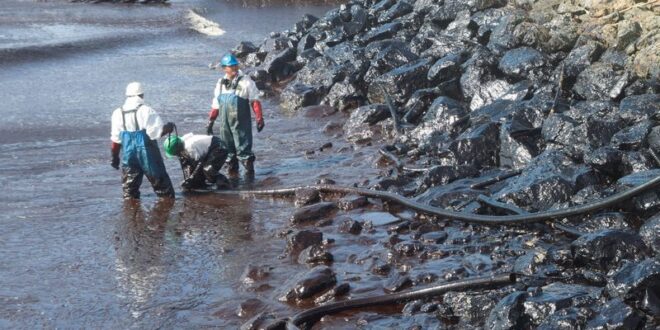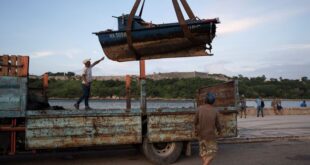SCARBOROUGH, Tobago (Reuters) -Nine days after a slick was first spotted by Trinidad and Tobago’s Coast Guard, an oil leak from a capsized barge remains unplugged, according to first responders and authorities, raising alarms for nations across the Caribbean Sea.
The spill has spread miles from Tobago’s shore, the area first impacted by the incident, leading authorities to alert its Caribbean neighbors, including Venezuela and the island of Grenada.
A barge pulled by a tugboat caused the spill, Trinidad’s government has said, but details of the incident remain unclear, including the type of petroleum leaking, the ship’s intended destination, owner and if any members of the crew were lost.
“This looks like it will continue for a few weeks. I cannot simply sit down and do nothing,” said Edwin Ramkisson, who makes a living fishing for snapper and salmon in Lowlands, on Tobago’s Atlantic shore. “I need help cleaning my boat before moving to another port on the Caribbean side.”
The slick has reached about 144 kilometers (89 miles) into the Caribbean Sea and is moving at a rate of 14 km per hour, Tobago’s Chief Secretary Farley Augustine said on Thursday.
The twin-island nation’s government said the ship’s origin was Panama and it was bound for Guyana. However, monitoring service TankerTrackers.com has said the barge-tugboat combo was seen in satellite photos near Venezuela’s Puerto La Cruz refinery in late January, and it was headed to St. Vincent and Grenadines days before the spill.
Venezuela’s oil minister Pedro Tellechea told reporters on Friday the vessel “has nothing to do” with state oil company PDVSA or Venezuela, but the country is collaborating with Trinidad’s investigation including the oil’s type.
Grenada did not reply to a request for comment.
The barge is believed to have carried as much as 35,000 barrels of fuel oil, according to Augustine. The spill has stained Tobago’s beaches, impacting wildlife and tourism, and has posed a risk to the Scarborough cruise ship port.
Several beach and golf resorts in Tobago that typically receive foreign tourists have been forced to close access to the ocean.
About 2,000 barrels of oil have been collected so far, the head of Tobago’s Emergency Management Agency Allan Stewart said on Friday, adding that the island is short of protective equipment for volunteers and crews.
(Reoprting by Curtis Williams in Scarborough and Tibisay Romero in Yagua, Venezuela; Writing by Marianna Parraga; Editing by Bill Berkrot, Kirsten Donovan)
 BeritaKini.biz Berita Viral Terkini di Malaysia
BeritaKini.biz Berita Viral Terkini di Malaysia





